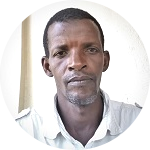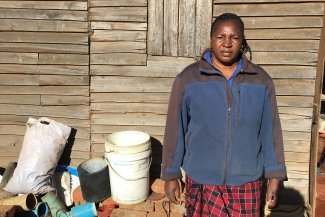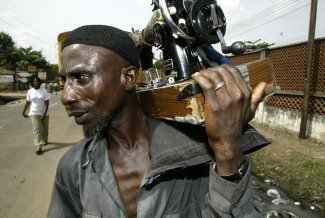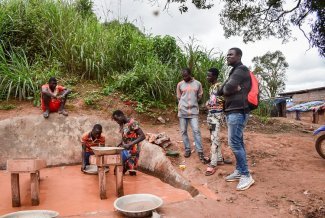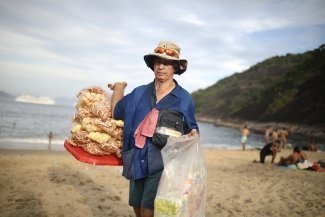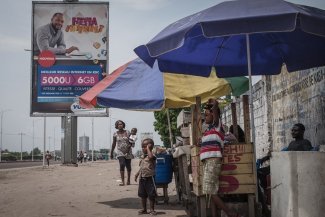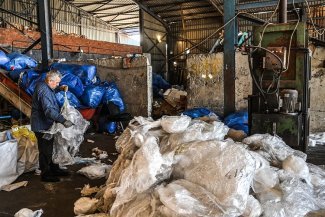: In this 31 January 2008 archive photo, people drive by the entrance to the Fria bauxite reduction plant, one of Africa’s first alumina processing plants and the largest industrial enterprise in Guinea.
The first alumina plant on the African continent was built by the French industrial group Pechiney in the late 1950s in Fria, a town 160 kilometres north of the Guinean capital of Conakry. At the height of its operations in the 1970s, this industrial flagship generated major economic benefits for the town where it was built. Today, the plant is a mere shadow of its former self. Former employees of the Fria plant are fighting to access their pensions, while current employees are fighting to regain the working conditions they once enjoyed.
The story begins in the early 1940s, when exploration companies found strong evidence of bauxite in Fria. The mineral, which is very abundant in Guinea, is processed to alumina, which is used to produce aluminium. Bauxite mining is the second-largest employer after the civil service. In 1957, following feasibility studies, the then French colonial administration decided to build a plant on the Kimbo plateau. The shareholders of the Compagnie de Fria, as it was then called, were American, French, British, Swiss and German.
On 2 October 1958, Guinea won its independence from France. Sékou Touré, the country’s first president, decided to transform the Compagnie de Fria into a semi-public company called Friguia. Forty-nine per cent of its shares were held by Guinea and 51 per cent by foreign companies grouped together in a holding company called Frialco.
The Kimbo alumina plant brought rapid economic development and population growth to the town of Fria. From a few hundred inhabitants in the 1960s, Fria has grown to an estimated population of 120,000 today. Attracted by the opportunities that the town offered, workers from all walks of life were able to find employment there.
“Thanks to the alumina plant, many of the workers’ children were able to get a good education and go on to became senior civil servants,” recalls Elhadj Oumar, a former worker at the plant who is now retired.
The decline
In 1997, the plant was sold by its shareholders to an American company called Renox. Six years later, Renox in turn sold its shares to Rusal, the world’s leading exporter of alumina, an international company of Russian origin. From 2008 onwards, Friguia’s economic situation began to worsen. Faced with deteriorating working conditions, the plant’s workers’ union called a strike in April 2012, putting forward a list of 24 demands topped by an increase in salaries. But negotiations stalled and production ground to a halt. Thousands of employees and subcontractors were left without pay.
Several years passed before the government, led by former president Alpha Condé, organised new negotiations that allowed the plant to reopen in 2018. But this came at a price: the Russian company, which had ambitions to exploit the rich bauxite deposit at Dian Dian, located in the same region, asked the Guinean government for exclusive access to the new site as a condition for resuming its activities at the Fria plant.
“Despite the resumption of activities, the Russians refused to pay us until we acknowledged our responsibility for the losses suffered by the company during the strike. We refused to do so,” Mamadou Camara, a former trade unionist, tells Equal Times.
After the government intervened, the company finally reversed its decision and paid the wages – albeit with a significant delay.
While some workers were able to return to work with a monthly salary, former workers reported that they were experiencing considerable difficulty claiming their pension entitlements.
After the mine reopened, Rusal outsourced the management of human resources to the Société d’Embauche et d’Intérim des Travailleurs Africains (SEINTA). According to many first-hand sources, SEINTA, which became the sole contact for plant management, paid employees in cash and did not provide pay slips, as had been the case before the strike.
The cessation of operations also had serious consequences for the town and its 120,000 inhabitants, whose lives were inextricably linked with the plant. Fria was without water and electricity for many months as the distribution system depended to a large extent on the plant’s activity. The town’s air and water were contaminated by pollution. Some workers fell ill and others died without having their rights recognised.
Widows lead the fight
Several of the ever-growing number of widows of former plant workers decided to form an association to fight for the pensions of their deceased husbands. “Our husbands served in this factory for a long time. Many of them died from illnesses contracted during their service. As soon as they died, on the very same day, the company took their names off the list of those receiving assistance,” says Hawa Camara, president of the association of widows and pensioners from the Rusal plant.
The 500 widows use peaceful methods to make their voices heard, including staging sit-ins in front of the factory entrance, blocking the rails to prevent alumina from being transported to the port, occupying and cooking their meals in the streets. These protests lasted a decade and met with little success. Until recently.
On 5 September 2021, the Guinean army overthrew civilian rule and dissolved all republican institutions. To justify his coup d’état, the head of the military junta, Colonel Mamady Doumbouya, cited rampant corruption that had “infected the country”. Doumbouya promised that justice would henceforth be “the compass that will guide every citizen”. His speech raised great hopes among Guineans in general and former Rusal workers in particular.
In early 2023, a delegation of widows travelled 160 kilometres from Fria to the capital to meet the country’s new strongman. For the first time, they found an attentive ear. Colonel Doumbouya instructed his Minister of Labour to restore the widows’ rights.
As social security specialist Mboye Goumba explains, the workers and their families had not received their entitlements since 2012 “due to a lack of political will on the one hand, and a failure to apply the social security code on the other”.
A mission from the National Social Security Fund (CNSS) went to Fria to gather technical information. The mission required Rusal to provide retirement documents, certificates of cessation of work and non-payment, insurance books and other information.
On 10 February 2023, the Fria youth centre became the venue for the payment of pensions to retirees and widows from the alumina plant. Presiding over the ceremony, Minister of Labour and Civil Service Julien Yombouno described the payments as the redress of social injustice. On receiving his pension, the spokesman for the retirees, Josephe Gnakoye, who worked at the plant since 1975 and has been retired since 2014, described the 10th of February as a glorious day. “We fought hard. We wrote, we wrote again, we sent a lot of memos. But the solution was slow in coming. Thank you to the brave widows.”
In his speech, Bakary Sylla, director of the CNSS, recalled that many lost their lives while waiting for their rights to be restored. “But the beauty of social security is that when people pay into it, they not only protect themselves, but also their dependents, their children and their spouses,” he said to the applause of the beneficiaries.



